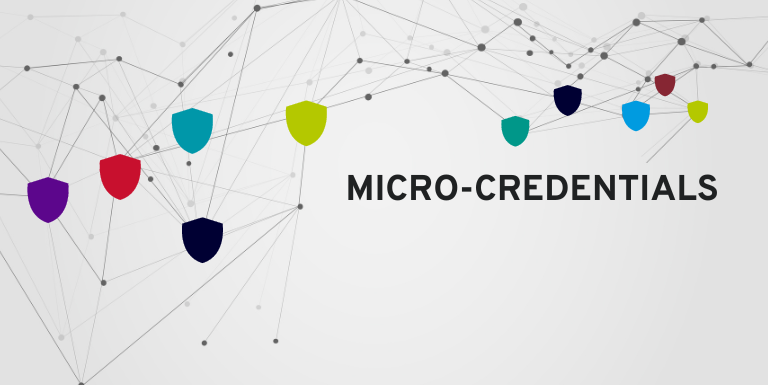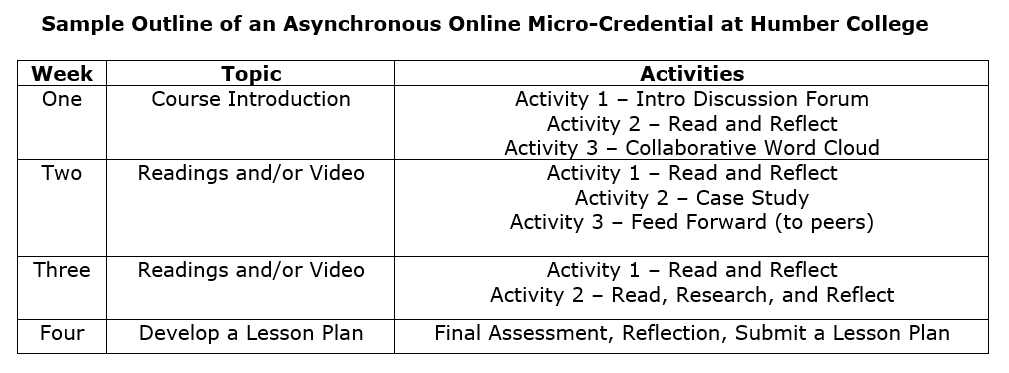Fostering Academic Growth With Micro-Credentials: Humber College's Innovative Professional Development Approach

Micro-credentials offer a flexible approach to professional learning, helping participants acquire skills that are directly applicable in their professional environments. Moreover, micro-credentials are often recognized by a credentialling body with digital badges or certificates, which offer tangible evidence of learning and skill acquisition and add significant value to a professional's portfolio. Micro-credentials represent a vital component in the landscape of continuous professional development, offering a tailored, efficient, and practical route to acquiring and demonstrating new skills and knowledge.
The Higher Education Quality Council of Ontario (2021) defines micro-credentials as “a representation of learning, awarded for the completion of a short program that is focused on a discrete set of competencies (i.e., skills, knowledge, attributes), and is sometimes related to other credentials” (para. 4). In 2023, Humber College's Innovative Learning (IL) team introduced a set of micro-credentials designed to foster academic growth and skill development among faculty. This innovative approach is a testament to the college's commitment to fostering a culture of lifelong learning and its ability to adapt to the evolving demands of 21st century polytechnical education.
Origins of Micro-Credentials for Humber College Faculty
Humber College’s academic plan (2023) is committed to three priorities:
- Recognition of prior learning (RPL) and pathways to new programs;
- Personalizing the learning journey, including providing delivery preferences and flexibility; and
- Empowering teaching and learning by supporting all faculty (pp. 15-21).
These priorities have informed planning and direction for student learning and faculty professional learning.
Integrating RPL, Flexible Learning, and Support for Faculty With Micro-Credential Offerings
To ensure that all faculty have access to well-designed teaching-focused modules, seven micro-credential course offerings are available to faculty and interested staff members at the college every semester, and at least three times during each academic year. At Humber, it is essential that our part-time faculty have ample access to rich learning opportunities related to teaching and learning, while also honoring their busy schedules and limited time availability. Our asynchronous online micro-credential courses allow for these faculty members to connect with colleagues and develop skills that will help them in their professional teaching practice.
In 2023, IL launched the micro-credential courses, all of which are well grounded in evidence-based teaching and learning topics, themes, and methodologies. Faculty can participate in courses that closely align with their pedagogical interests. The faculty development-focused micro-credentials were created to ensure that all faculty members, both full-time and part-time, have equitable access to well-developed and high-quality professional learning experiences. Recognizing the diverse backgrounds and schedules of its teaching faculty, the IL team aimed to democratize professional learning opportunities by offering them as asynchronous online modules offered at no cost. By incorporating micro-credentials into faculty’s professional learning, Humber is providing a flexible and accessible pathway for faculty members to enhance their teaching skills and stay abreast of evolving educational practices. This strategic professional learning initiative underscores IL’s dedication to supporting all educators in their pursuit of excellence, ultimately enriching the learning experience for students across the institution.
We are currently offering seven options, and more are in development. Successful completion of a final assessment for each micro-credential is reflected in a Humber transcript.
Innovative Learning’s Micro-Credential Course Offerings
- Facilitating Learning empowers faculty to develop strategies for creating meaningful and impactful learning experiences.
- Curriculum Design and Development familiarizes educators with the curriculum development process, encouraging them to craft well-designed and thoughtfully sequenced course curricula.
- Teaching and Learning in HyFlex introduces faculty to the methods, practices, and tools for adapting an existing in-person lesson plan for HyFlex teaching. Faculty review strategies and methods to create a learning experience that engages learners in all three modalities and ensures an equivalent experience for all students.
- Assessment for Learning focuses on integrating assessments into the learning process, rather than viewing them as a mere outcome of learning.
- Educational Technology and Accessibility introduces faculty to the intersection of technology and accessibility, promoting inclusivity in learning environments.
- Equity and Anti-Oppressive Teaching in Post-Secondary Education aims to build capacity among Humber College staff in relation to equitable and anti-oppressive teaching. Faculty participants become familiar with the core tenets of equitable and anti-oppressive teaching, including identifying one’s own positionality, distinguishing between equality and equity, and engaging in critical self-reflexivity. Participants also explore four domains of teaching—content, pedagogy, access, and climate—and assess their own teaching beliefs and practices in preparation for a concrete action plan they can implement in their own teaching contexts at Humber College.
- Universal Design for Learning (UDL) Institute is an immersive three-day in-person professional learning experience for Humber faculty. During the Institute, Humber faculty reflect on and create opportunities to adopt a UDL framework into their teaching practice, examine their current curriculum practices, and design learning experiences that integrate an antiracism and UDL framework. Faculty who participate in the Institute and successfully complete the final assessment receive a micro-credential.
These micro-credential offerings also provide added value to the Teaching Excellence Program (TEP), a mandatory two-year full-time faculty learning program that focuses on the foundations of teaching and learning. The course, comprised of ~92 hours of instruction, models student-centered teaching, but we recognized the inflexibility and lack of choice of topics and content. The micro-credentials offer flexibility and choice as a component of TEP.
Design and Development of Innovative Learning’s Micro-Credentials
Each micro-credential is structured into four modules, cumulating in 12 hours of curriculum delivery. The courses are delivered over three weeks in a facilitated asynchronous online format. This approach offers flexibility, structure, and guidance with facilitators participating in discussions and providing assignment feedback. This method of delivery aligns with the busy schedules of faculty and staff, allowing them to engage with the material at their own pace and convenience while providing enough structure and facilitation to ensure module completion.
Impact and the Road Ahead
From January to November 2023, 380 faculty and staff members engaged with these micro-credentials. In line with Humber College's commitment to ensuring accessibility, the micro-credentials are offered by the college at no cost, ensuring that all faculty and staff members have an equal opportunity to benefit from these learning experiences. A learning consultant assesses modules to ensure that content meets W3C Accessibility Guidelines.
Following the successful implementation of these modules, the IL team is reviewing feedback to enhance and update the current offerings. This process is key to maintaining the relevance and efficacy of micro-credentials. Micro-credential revisions and continuous improvements include:
- Updating and modularization
- Mapping of micro-credentials
- Designing/linking RPL assessments for micro-credentials and modules
IL’s plan to support the 2023 academic plan includes the continued exploration and development of learning opportunities that provide increased offerings of flexible, meaningful, and relevant learning opportunities for all faculty. Included in these planned offerings are:
- Free standing modules (~5 hours)
- Moving from resource pages to active and designed learning experiences
- Curated, personalized support for contract faculty (e.g., teaching at Humber for the first time, teaching hybrid at Humber)
- Targeted supports for mid-career full-time faculty
- Specific supports for competency-based learning and assessment
The introduction of micro-credentials represents Innovative Learning’s commitment to promoting and supporting a culture of lifelong learning and offering valuable professional development opportunities for Humber faculty regardless of where they are in their career, teaching and learning journey, or personal professional development goals.
References
Higher Education Quality Council of Ontario. (2021). Making sense of microcredentials. https://heqco.ca/pub/making-sense-of-microcredentials
Humber College. (2023). Academic plan 2023-2026: Looking forward. https://humber.ca/academic-division/academic-plan
Tamara Bahr is an Educational Developer at Humber College in Toronto, Ontario, Canada.
Opinions expressed in Learning Abstracts are those of the author(s) and do not necessarily reflect those of the League for Innovation in the Community College.










